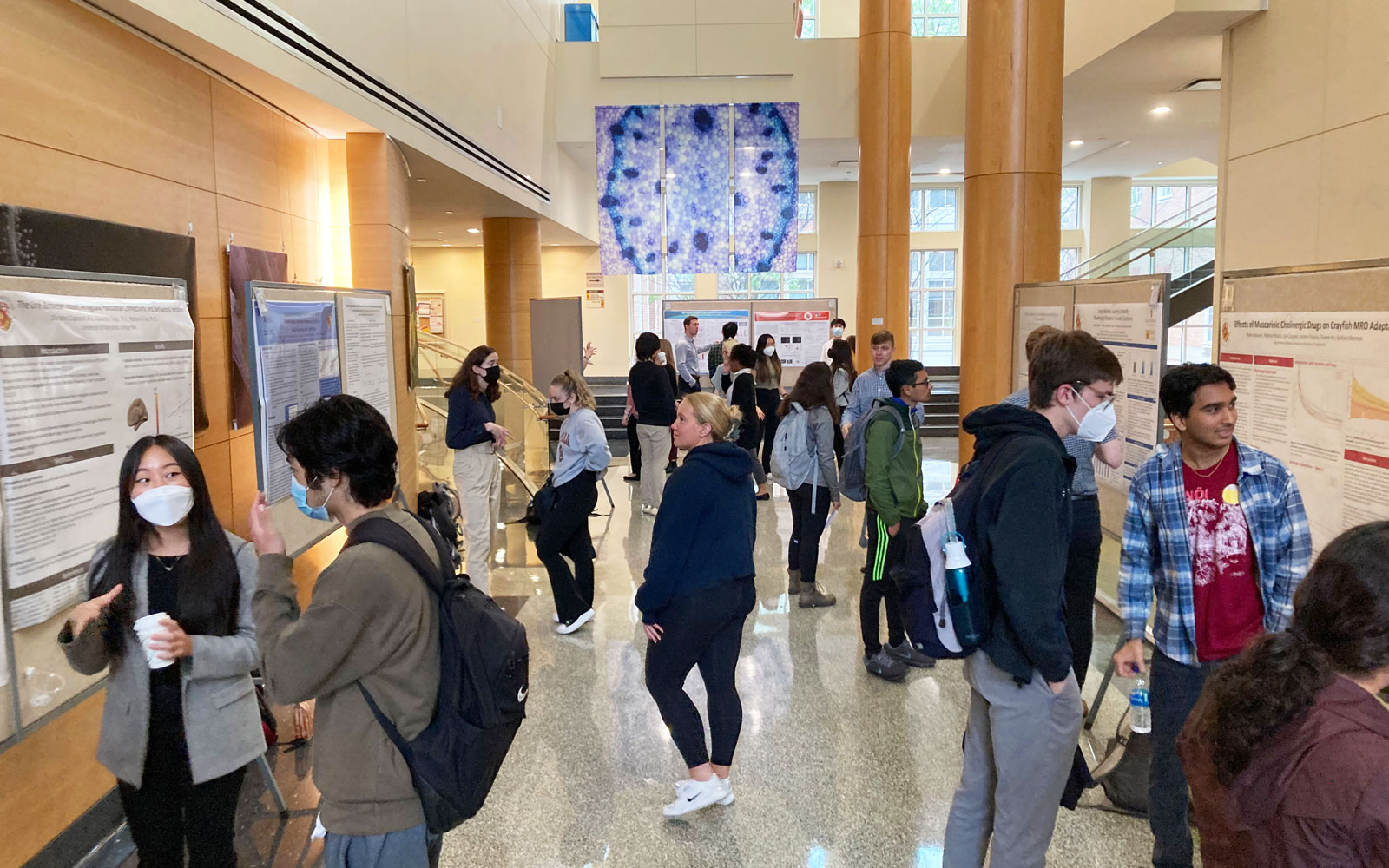
|
 |
The first annual Undergraduate Neuroscience Research Fair was held on Friday, May 6, 2022. |
|
The Colonnade of the Bioscience Research Building was abuzz with enthusiasm on Friday as, popcorn in hand, attendees at the first annual Undergraduate Neuroscience Research Fair perused posters displaying research from the past year.
Thirty-four undergraduates across seventeen projects conversed about experiences working in a variety of neuroscience approaches, including methods related to animal models such as chemogenetics and electrophysiology, human neuroimaging techniques, and machine learning and computational approaches.
Many of the students were mentored by Brain and Behavior Institute-affiliated faculty in biology, human development, kinesiology and psychology departments. “Working with undergraduate students is one of the most rewarding parts of research and teaching,” said Tracy Riggins, an associate professor of psychology. “The best moments are when we truly collaborate—namely, when students can see science from my perspective and when students’ questions challenge and encourage me to think deeply about a topic from their perspectives.”
Many student presenters expressed excitement about continuing with research as their undergraduate and postgraduate careers advance.
“We looked at different memory measures—specifically in episodic, working and long-term memory—across the lifespan,” said sophomore Sophia Hale, whose research included data from Riggins as well as investigators J. Carson Smith, a professor of kinesiology, and Jeremy Purcell, a faculty research scientist at the Maryland Neuroimaging Center (MNC). “I hope to keep working with this data over the summer to continue analyzing the underlying mechanisms that control how memory changes.”
Grace Kelly, a senior, noted that research experience was key in her decision to apply to medical schools. “I love the research side of neuroscience,” Kelly said, “so I am looking especially at neurology and neuropsychology programs.”
As the afternoon came to a close, winning posters by Christina Capozzoli, Nikkola Susic and Jonathan Shiferaw were awarded with a custom pin by local artist Leslie Holt. The pins depicted a PET brain scan image representing mindfulness.
For Riggins, mindfulness is a practice that she incorporates into her research pedagogy.
“Some of the most exciting moments in my lab are when, after collecting data for months or even years, a student and I sit side-by-side before hitting the ‘run analysis’ button,” said Riggins. “I like to take a minute to ask the student how they’re feeling. Excited? Eager? A little nervous? If so, I often suggest the student should pursue graduate studies. That excitement over answering a research question is such a unique experience, and I feel so fortunate to be able to savor and share those moments with Maryland undergraduates.”
Organized by neuroscience undergraduate research coordinators Amanda Chicoli and Chan Lin, the fair rounded out a semester of continued elevation for neuroscience at UMD, which welcomed two new magnetic resonance scanners to campus in April. On April 22, the MNC revealed its new Prisma MRI scanner, and last week, the BBI launched the small animal magnetic resonance imaging facility, which promotes research at the intersection of biological imaging and analytical methodologies.
“It was fantastic to see all of these students presenting and engaging at this level of neuroscience research,” said Hilary Bierman, director of the neuroscience undergraduate major. “The fair was a great reflection of the high caliber of our students, our program, and all of the staff, instructors and research mentors. We are succeeding in nurturing the minds of young neuroscientists.”
At the conclusion of just its second full year, the undergraduate neuroscience program has already attracted 239 majors.
The BBI’s contribution to the success of the undergraduate neuroscience major involves partnering with departments in CMNS and BSOS to recruit diverse faculty to teach courses for the new program, including new hires Juan Angueyra, an assistant professor starting January 2023 in the BBI with a joint appointment in biology, and Caroline Charpentier, an assistant professor starting August 2023 in the BBI with a joint appointment in psychology.
###
Writer: Nathaniel Underland, underlan@umd.edu
About the Brain and Behavior Institute: The mission of the BBI is to maximize existing strengths in neuroscience research, education and training at the University of Maryland and to elevate campus neuroscience through innovative, multidisciplinary approaches that expand our research portfolio, develop novel tools and approaches and advance the translation of basic science. A centralized community of neuroscientists, engineers, computer scientists, mathematicians, physical scientists, cognitive scientists and humanities scholars, the BBI looks to solve some of the most pressing problems related to nervous system function and disease.
Related Articles:
Autism Research Resonates in Hearing-Focused Project
Uncovering the mysteries of networking in the brain
How Home Alone Helped UMD Neuroscientists Unlock Brain Scan Data
Deliberation Computation: The Data Behind Decision Making
The Mystery of Our Early Missing Memories
BBI Researchers Among Those Selected for UMD Coronavirus Research Seed Funds
New Perspectives on Some of the Oldest Questions about Human Language
2023 BBI Seed Grants Inspire New Interdisciplinary Collaborations
Training Can Improve Older Adults’ Ability to Discriminate Rapid Changes in Sound
New robust and scalable computational methodology developed by UMD researchers helps identify directed connectivity within the brain
May 9, 2022
|

